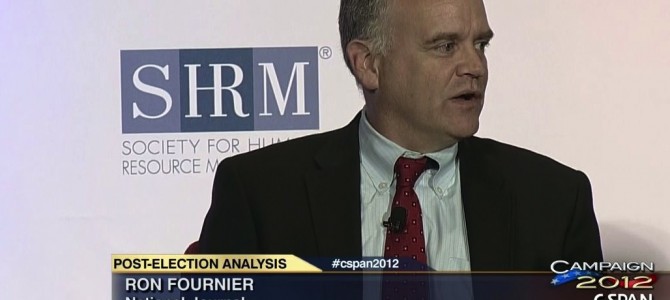When the Congressional Budget Office this week nearly tripled its previous assessment of how many people would stop working because of Obamacare, some in the media tried to change the story to one focused on how Republicans were too uncharitable about what this meant for the country and her economy. Obama and his water carriers in the media tried to spin it as spectacular news, really, that simply shows how Obamacare liberates some people to subsidize the lives of others. Yesterday, CBO director Douglas Elmendorf affirmed, though, that the troubled law creates a “disincentive for people to work.”
Never mind that all this workforce-fleeing is happening in the middle of a major “income inequality” class warfare push by Team Obama. Just set that all aside. After writing a weak, pooh-poohing column on the original report, National Journal’s Ron Fournier comes out with a new column today. He pushes it out at 9:05 AM, 9:06 AM, 9:06 AM again, 9:07 AM, and 9:09 AM before hitting on this winning tweet a minute later:
The GOP argument on Obamacare has more than a whiff of Reagan-era racial “welfare queen” politics —> http://t.co/2ZQ0Baj9pQ
— Ron Fournier (@ron_fournier) February 6, 2014
Le sigh. It’s not that some people think creating disincentives to work is unhealthy or unethical. It’s that they’re racist. It’s so easy to call people racist. In fact, Fournier doesn’t bother in any way to substantiate the slur. It’s pretty simple: If you show the slightest bit of skepticism about government programs that take the earnings of one person and use them to pay for the existence of another, you’re racist. If you think that increasing subsidization is bad for the American individual and the family, you’re racist. Hell, if you provide raw numbers like Elmendorf, you’re racist! Some might note that these claims say so much about the racial assumptions of people like Fournier and so little about people who care about basic economics or liberty-based governance. But that’s probably, somehow, racist too. Here’s where Fournier really showed the laziness of casual slurs about racism. He tweets:
In light of today’s #Obamacare column, a little background: “How and Why Romney is Playing the Race Card.” http://t.co/bizWmTfCgj
— Ron Fournier (@ron_fournier) February 6, 2014
If you go to that link, you get a discussion of an advertisement Mitt Romney made about how Obama gutted welfare reform (which, I hasten to add, was a wildly popular bipartisan program signed into law by President Bill Clinton). There you also get to see how Fournier associates certain terms with racial slurs and how this means, somehow, both that his racist translation of other people’s words is not racist but that other people are racist. But let’s put that aside. He writes in that column:
Before explaining why these tactics work (and why Romney’s team knows, or should know, they are playing the race card), let’s quickly deal with this fact: The ad is wrong. As countless impartial fact-checkers have noted, the Obama administration memo cited by the Romney team actually gives states flexibility to find better ways of getting welfare recipients into jobs.
Now it is absolutely true that the groupthinkers all groupthought that Obama’s changes to welfare law were awesome and that Romney’s criticism was liar-liar-pants-on-fire. Someone I’m related to by marriage, however, utterly eviscerated that groupthink claim by doing what the groupthinkers didn’t do. He a) didn’t accept Team Obama’s words as the Gospel truth, unlike the folks at Politi”Fact”, b) spoke to the original author of welfare reform and c) checked out the claims of each. You can read all about it in his 4,000-word article headlined “Obama’s Palace Guard:
How media fact checkers made themselves of service to the president in the welfare reform debate.”
Yes, if you believe it’s racist to say that people on welfare should work, you will probably be comforted by the soothing words of Fournier and be reassured that your political opponents don’t need to be listened to because they are pure evil. I’m not much for that political game, but it does show how groupthink about Republicans being racist spreads.
Unfortunately what gets missed in the fun game of “You’re a racist for disagreeing with me!” is a discussion about how much people should be forced to subsidize the lives of others, whether entitlement programs that disincentivize labor are healthy for individuals or society, whether the explosive growth of disability rolls can be sustained and so on and so forth.
Fournier seeks to cultivate a “pox on both your houses” image of someone who hits both Republicans and Democrats. In an environment of nearly complete media fealty to Team Obama, this is noteworthy. But Fournier critiques Obama and his team for their inept handling of situations. He critiques with regret and sadness and in a spirit of how he wishes Obama could just stop being incompetent. On the other hand, Fournier lambasts conservatives for their ideology, which he views as evil. These are in no way equivalent critiques and only speak all the more to the bias that pervades our media.








